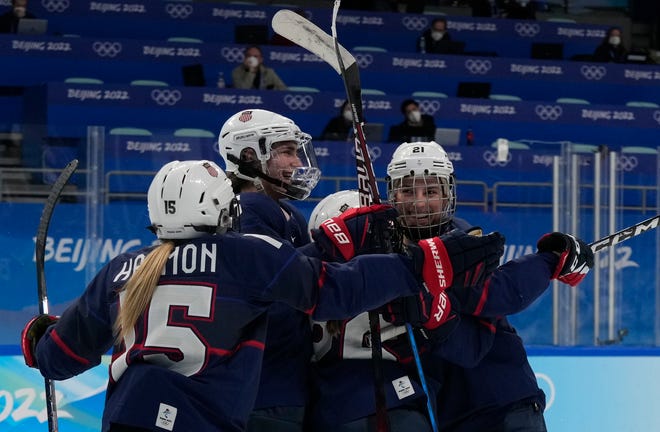
BEIJING — In almost every way possible, the 2022 Winter Games were a most unusual Olympics. Whether it was life in the so-called “closed loop” that separated Olympic athletes, journalists and workers from the rest of China, the below-zero temperatures and howling winds in the mountains or the daily anxiety of COVID-19 testing and possible isolation, it was a difficult journey for everyone who made it here.
Then the competition began, and many of the hot-button issues surrounding the start of the Olympics – like human rights – faded to the background. New ones, like a major doping scandal in figure skating, arose. At the end, though, China pulled off a Winter Games without too many hiccups – though it was more successful for some than others.
The U.S. finished with 25 medals overall, the fifth-most behind Norway, Russia, Germany and Canada and an uptick from 2018 (23 medals) and nearly on par with 2014 (28 medals). Here’s a day-by-day look back at what happened in Beijing:
Feb. 2: Competition for the 2022 Beijing Games officially got underway with the first session of mixed doubles curling.

Feb. 3:The freestyle skiing events began with men’s and women’s moguls qualification runs, while ice hockey began with four women’s games. The Americans got off to a strong start with a 5-2 win over Finland, while Canada beat Switzerland 12-1.
Feb. 4: The figure skating team event – which would play an unusually large role in the narrative of these Games – started in the morning, with men’s singles followed by rhythm dance and then the pairs short program. As usual on the first Friday of the Olympics, everything built toward the opening ceremony, which took place at the famed “Bird's Nest” National Stadium, which was built for the 2008 Summer Games. The most significant heads of state in attendance were Russian president Vladimir Putin, Saudi Arabian crown prince Mohammed bin Salman, Egyptian president Abdel Fattah el-Sisi and Polish president Andrzej Duda. During the parade of nations, cameras caught Putin sleeping – or perhaps pretending to be asleep – when Ukraine’s Olympic team made its entrance. China’s choice of Uyghur cross-country skier Dinigeer Yilamujiang as one of the two athletes to light the cauldron raised eyebrows, as China’s alleged human rights abuses, including the detention of Uyghurs in the Xinjiang region, is a key reason why the U.S. and many other Western countries staged a diplomatic boycott of these Games.
Feb 5: The first full day of competition got underway with the women’s snowboard slopestyle, where three Americans advanced to the finals. Dutch speedskater Irene Schouten set the Olympic record for the women’s 3,000-meter mass start, while China won its first gold medal of the Games in short track's mixed team relay. U.S. women’s hockey shut out Russia, 5-0.
Feb. 6: Snowboarder Julia Marino secured the first Team USA medal of the Games, finishing second in slopestyle to Zoi Sadowski-Synnott, who won the first-ever Winter Olympics gold medal for New Zealand. American Jaelin Kauf, a two-time world champion, took silver in the women’s moguls. The team competition continued in figure skating, with 15-year old Russian Kamila Valieva scoring 90.18 in her short program, well ahead of the field.
USA MEDAL COUNT: Full list of every medal won by Team USA at Beijing Games
WHO LEADS THE MEDAL COUNT? How each country performed at the Winter Games
Feb. 7: The morning began with a big surprise when Mikaela Shiffrin, the top Alpine skier in the world in the tech events, crashed out of the giant slalom about 10 seconds into the event she won at the 2018 Olympics in Pyeongchang. “I won’t ever get over this,” she said, and it turned into a harbinger of difficulties to come for the American star. Canadian Max Parrot, who underwent treatment for Hodgkin’s lymphoma in 2019, won the men’s snowboard slopestyle while defending Olympic champion Red Gerard finished fourth. Ireen Wust, the 35-year old Dutch speedskater, became the first athlete to win golds at five different Olympics in the 1,500 meters. It was her sixth gold and 12th overall medal. The team figure skating event wrapped up with the Americans finishing second to the Russians, but Vincent Zhou was not able to celebrate with the team due to a positive COVID-19 test.

Feb. 8: Despite out-shooting Canada 53-27, the U.S. women’s hockey team lost 4-2 in the preliminary round, though both teams knew there would likely be a rematch in the gold medal game. Ester Ledecka of the Czech Republic, who competes in both Alpine and snowboarding, won the snowboarding parallel giant slalom for the second consecutive Olympics. Jessie Diggins, the star of the American women’s cross-country team, took bronze in the women’s sprint freestyle while teammate Rosie Brennan was right behind in fourth. Eileen Gu, the American-born freestyle skiing star who chose to compete for her mother’s native China, landed the first double cork 1620 of her career on the final run to win gold in the big air final. Ryan Cochran-Siegle, whose mother Barbara Cochran won gold in slalom at the 1972 Olympics, won a shocking silver in the super-G. Nathan Chen put on one of the best performances of his career in the men’s figure skating short program to score 113.97. Meanwhile, word began to percolate that something was up with the team results when the medals were not given out.
Feb 9: The issue with the team figure skating event was revealed to the world. Valieva, the gold medal favorite in the women’s competition, had tested positive for a banned substance. She continued to practice as Russia appealed the result. Meanwhile, Shiffrin posted another puzzling “DNF” – Did Not Finish – in the slalom, arguably her best event. The U.S. men’s curling team began its gold medal defense with a 6-5 win over Russia. Freestyle skier Colby Stevenson, who is known as a slopestyle specialist, snagged what he called a “miracle” silver medal in the big air with a double cork 1800 on his final jump. But the first American gold of the Games went to 36-year-old Lindsey Jacobellis, who won the women's snowboard cross – the same event she was going to win in 2006 before falling on the second-to-last jump while attempting a celebratory snowboard grab.
Feb. 10: It was a banner day for the U.S. team led by Chen, who came to Beijing looking to make up for a disappointing performance four years ago. He more than delivered with five quads and a smashing free skate score of 218.63 to win gold while skating to Elton John’s “Rocketman.” Chloe Kim, who was a breakout star in 2018 by winning the halfpipe gold medal in snowboarding, took care of business again. Her first run, which included a pair of 1080 spins, was more than enough to win a second gold. Later that evening, Americans won the debut of the mixed team aerials event, marking just the third time in history the U.S. won three gold medals in a day at the Winter Olympics.

Feb. 11: After revealing officially that this would be his fifth and final Olympics, three-time gold medalist Shaun White ended his career with a fourth-place finish in the halfpipe. The torch was passed to Japan’s Ayumu Hirano, who put down a pair of sensational runs. His gold-clincher included a triple cork 1440 and two double cork 1440s. Shiffrin finished a race for the first time at these Games, finishing ninth in the super-G. The U.S. women’s hockey team beat the Czech Republic 4-1 in the quarterfinals. Swedish speedskater Nils van der Poel, who already won gold in the 5,000, added another title in the 10,000 and smashed his own world record by more than two seconds.
Feb. 12: At a second straight Winter Games without NHL players, the mostly unknown U.S. team of college players and European league veterans beat Canada, 4-2, on its way to a 3-0 finish in the group stage. American skeleton racer Katie Uhlaender, a veteran of five Olympics, finished sixth in her likely last career appearance. The U.S. mixed snowboard cross team of Jacobellis and 40-year-old Nick Baumgartner turned back the clock by winning gold.

Feb. 13: Erin Jackson of Ocala, Florida, was favored to win the 500-meter speedskating race and she delivered, becoming the first Black woman to win an individual Olympic medal in the history of the sport. She was also the first American to win the 500 since Bonnie Blair in 1994.

Feb. 14: Kaillie Humphries, a former Canadian bobsledder who only received her U.S. citizenship in December, won gold in the inaugural women’s monobob. American stalwart Elana Meyers Taylor, competing in her fourth Olympics, came back after a disappointing first two runs to win silver. It was especially sweet for Meyers Taylor, who spent the first part of the Olympics in isolation due to a positive COVID-19 test. The American pair of Madison Hubbell and Zach Donohue took bronze in ice dance. But the biggest news of the day was the Court of Arbitration for Sport ruling that Valieva could compete in the women’s figure skating competition despite the positive test.
Feb. 15: With the eyes of the world on figure skating, Valieva led the short program with 82.16, though she did stumble on a triple axel and looked emotionally drained at the end of her performance. Shiffrin’s difficult Olympics continued in the women’s downhill, where she finished 18th. Italy’s Sofia Goggia, the defending champion, won a remarkable silver medal just three weeks after a major crash in Cortina that left her with a partially torn ligament in her left knee and small fracture in her fibula. Gu took a silver medal in the slopestyle freeski, while 17-year old former child actor Su Yiming gave China the gold medal in the men’s snowboard big air.
Feb. 16: Alex Hall, who has been the top American freeskier for the last couple years, took a creative approach to the slopestyle course and won gold while Nick Goepper won silver – his third consecutive Games medaling in this event. Americans have won six of the nine slopestyle medals since it was added to the Olympics. The U.S. men’s hockey team was eliminated in the quarterfinals, losing to Slovakia 3-2 in a penalty shootout after giving up the tying goal with less than a minute left in regulation.

Feb. 17:Valieva’s shaky long program with multiple stumbles ultimately took her off the podium, behind Russian teammates Anna Shcherbakova and Alexandra Trusova. But the emotional scenes afterwards sparked global debate about whether she was ultimately the victim in this sad story. Alysa Liu was the top American in seventh place. Canada won the gold medal in women’s hockey, surviving a third-period flurry by the Americans to hold on 3-2 and avenge its defeat in the 2018 finals. Shiffrin, meanwhile, skied out once again, this time in the slalom portion of the Alpine combined. The U.S. men’s curling team needed to beat Denmark in the morning to qualify for the medal round and got it done, 7-5, but lost the semifinals to Great Britain later in the evening. Speedskater Brittany Bowe, the world record holder in the 1,000 meters, won her first Olympic medal with a bronze in the event.
Feb. 18: The U.S. men lost the curling bronze medal match to Canada, 8-5, but skipper John Shuster vowed to try for a sixth Olympic appearance in 2026. Johannes Thingnes Boe won his fourth gold medal in six biathlon events at these Games in the 15K mass start, leading a Norwegian effort that topped the table with 37 total medals and 16 golds. Boe has five golds, two silvers and a bronze from the last two Olympics. Gu completed her first Olympics with a second gold medal, this one in the freeski halfpipe.

Feb. 19: Meyers Taylor, in what may be the last race of her bobsled career, piloted the Americans to a bronze medal in the two-woman race. Though she never won gold, she comes home with her fifth medal in four Olympics. Sweden finally took gold in men’s curling, beating Great Britain four years after a crushing upset loss to the Americans in the final. Americans David Wise and Alex Ferreira took silver and bronze, respectively, in the freeski halfpipe behind New Zealand’s Nico Porteous.
Feb. 20: Diggins ended her very good Olympics on a high note, taking silver in the women’s 30K race behind Norway’s Therese Johaug, who won three cross-country golds at these Games. Diggins was the only woman to finish in the top eight of all six cross-country races she could enter. Shiffrin’s last chance at a medal went by the wayside in the mixed team parallel final, which was delayed by a day due to high winds. The U.S. finished fourth in the event. The Germans completed a dominant performance in sliding, winning gold and silver in the four-man bobsled. Overall, the German team won seven medals in bobsled, six in luge and three in skeleton. Finland beat Russia, 2-1, to win its first-ever gold medal in men's hockey to finish the competition leading into the closing ceremony.
Source link













